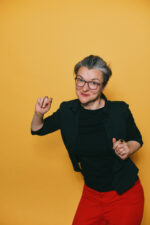Cultural Education
At the Warsaw Observatory of Culture, we know education and culture have a prominent role. In the ever-changing reality, given the new challenges and global and local crises that keep cropping up, we need tools to develop soft social skills and artistic tools, much needed to establish and maintain relationships. This is the rationale for our involvement in studying cultural education in Warsaw, and we made it one of our core programming priorities.
WOK presents the report Cultural Education in Research and Action, which concludes the second phase of our study on cultural education practices in Warsaw.
Our research process continues, and this report is an invitation to reflect, act upon, and further examine cultural education. The action research perspective that we have embraced allows the involved groups – practitioners, managers, local government officials – to continue this reflection independently and collaboratively, making cultural education a tool for social change. We invite you to download the report in two versions: a full version and a summary.

Nowe publiczności
Ważnymi obszarami wyłaniającymi się z badania są przede wszystkim nowe potrzeby publiczności: zarówno tych od dawna uczestniczących w edukacji kulturalnej, jak i tych, dla których dotychczas nie była ona projektowana. Po drugie, badanie analizuje możliwe kierunki współpracy pomiędzy sektorami kultury i edukacji, w tym szczególnie – szkół. Wreszcie bardzo ważnym obszarem wymagającym uwagi są kadry kultury: praktyczki i praktycy zaangażowani w edukację kulturalną w Warszawie. Szacunkowo jest to ok. 50 000 osób – warto zatem uważniej przyglądnąć się potrzebom, wyzwaniom i potencjałom tego środowiska.
Raport z badania Edukacja kulturalna w badaniach i działaniach jest kierowany przede wszystkim do osób zajmujących się edukacją kulturalną: praktyczek i praktyków, liderów i liderek instytucji, organizacji społecznych oraz zaangażowanych samorządowców.
Raport nie proponuje gotowych rozwiązań – raczej wskazuje kierunki dalszej pracy i refleksji oraz związane z nimi dobre praktyki, zapraszając środowisko do dalszej rozmowy i współpracy wokół tematów wymagających wsparcia. Wierzymy, że model tworzenia zaangażowanej społeczności wokół edukacji kulturalnej pozwoli najlepiej skorzystać z wyników naszej analizy.
W trzecim etapie badania przedstawicielki i przedstawiciele uczestniczących będą wypracowywać narzędzia, które pomogą w rozwijaniu potencjału edukacji kulturalnej w Warszawie – w odpowiedzi na zidentyfikowane wyzwania i potrzeby.
Raport powstał we współpracy z firmą Badania i Działania kierowaną przez Magdalenę Tędziagolską.
Zapraszamy do pobrania raportu w dwóch wersjach: pełnej oraz w formie podsumowania.
Below we present the subsequent stages of the process of examining cultural education in Warsaw.
The process of examining cultural education
The starting point for our study was the document entitled Cultural Education in Warsaw published in November 2022 during the Cultural Education Forum: A New Beginning. The document supplements the #Warsaw2023 Strategy and The Cultural Policy for the Capital City of Warsaw. The recommendations about cultural education featured in the documents are meant to serve as guidelines for institutions of culture, schools, community centres, NGOs, and educators. Our goal is to study the guidelines both on the microscale, from the perspective of cultural education practice, as well from a broader, interinstitutional angle.
You can see the document here:
Study Part 1
The primary objective of this stage (January – March 2023) of the study was to develop a semantic map of the notion of ‘cultural education’ and determine its role and the challenges it faces. We wanted to better understand the values, aspirations and goals of people involved in various cultural education projects. Furthermore, our research aimed to identify the phenomena and practices most relevant to the cooperation between educational and cultural institutions that will be the subject of in-depth study in the next stages of the study.
We invited 400 respondents from cultural and educational institutions to participate in the study. We received 126 responses to our survey and conducted 40 in-depth interviews. As a result of the study, 12 case studies were selected. The findings from the first stage will be included in the final report summarizing the first and second stages of the study.
Study Part 2
We continued with the second stage of the research between June and December 2023, this time focusing on diagnosing good practices, barriers, and challenges in the field of cultural education in Warsaw. We examined the institutions identified in the first phase of the research and conducted twelve case studies, including cultural institutions, extracurricular education facilities and non-profit organisations:
- Muzeum Warszawy
- Biblioteka na Woli
- MDK Łazienkowska
- VIII Ogródek Jordanowski
- Teatr Syrena
- MSN
- Centrum Aktywności Międzypokoleniowej
- Teatr 21
- Ośrodek Kultury Ochoty (OKO)
- Dom Kultury w Rembertowie
- Terminal Kultury Praga
- Przedszkole nr 17
We conducted several hundred hours of conversation during ninety interviews and spent dozens of hours observing over fifty different events and spaces. We also conducted four expert interviews and three focus group interviews with teachers.
In line with the methodological approach of action research, we opened up the research process to serve various groups affected by it and thus contribute to lasting changes in cultural education. We organised two networking meetings for cultural education practitioners and three workshops with representatives of the Education Office and the Culture Office of the City of Warsaw. The analysis and evaluation of cultural education activities was not an end in itselfs. We see great value in developing collaboration with a diverse group of stakeholders; it gives us hope that the developed tools and solutions will return to them, be applied and evaluated in further practice
The research process was extensive and conducted in multiple ways; detailed findings and recommendations will be presented in the final report in January 2024. It will be organised around external, intra-institutional, and cross-sectoral factors that shape cultural education in Warsaw.








